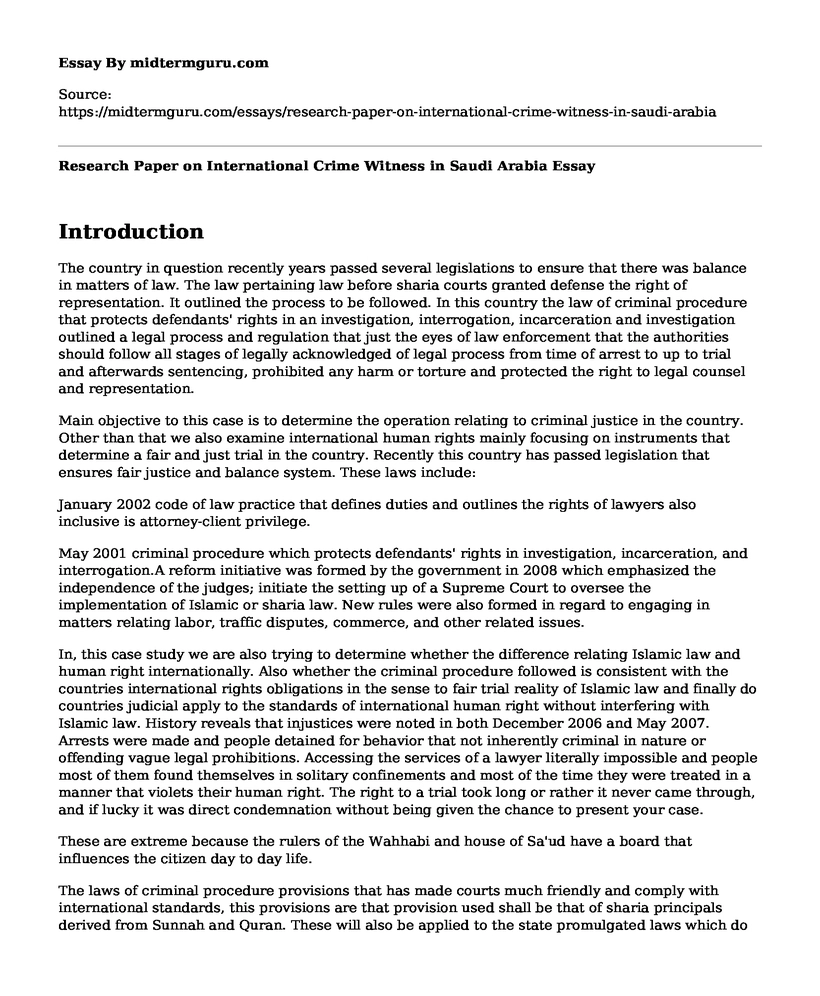Introduction
The country in question recently years passed several legislations to ensure that there was balance in matters of law. The law pertaining law before sharia courts granted defense the right of representation. It outlined the process to be followed. In this country the law of criminal procedure that protects defendants' rights in an investigation, interrogation, incarceration and investigation outlined a legal process and regulation that just the eyes of law enforcement that the authorities should follow all stages of legally acknowledged of legal process from time of arrest to up to trial and afterwards sentencing, prohibited any harm or torture and protected the right to legal counsel and representation.
Main objective to this case is to determine the operation relating to criminal justice in the country. Other than that we also examine international human rights mainly focusing on instruments that determine a fair and just trial in the country. Recently this country has passed legislation that ensures fair justice and balance system. These laws include:
January 2002 code of law practice that defines duties and outlines the rights of lawyers also inclusive is attorney-client privilege.
May 2001 criminal procedure which protects defendants' rights in investigation, incarceration, and interrogation.A reform initiative was formed by the government in 2008 which emphasized the independence of the judges; initiate the setting up of a Supreme Court to oversee the implementation of Islamic or sharia law. New rules were also formed in regard to engaging in matters relating labor, traffic disputes, commerce, and other related issues.
In, this case study we are also trying to determine whether the difference relating Islamic law and human right internationally. Also whether the criminal procedure followed is consistent with the countries international rights obligations in the sense to fair trial reality of Islamic law and finally do countries judicial apply to the standards of international human right without interfering with Islamic law. History reveals that injustices were noted in both December 2006 and May 2007. Arrests were made and people detained for behavior that not inherently criminal in nature or offending vague legal prohibitions. Accessing the services of a lawyer literally impossible and people most of them found themselves in solitary confinements and most of the time they were treated in a manner that violets their human right. The right to a trial took long or rather it never came through, and if lucky it was direct condemnation without being given the chance to present your case.
These are extreme because the rulers of the Wahhabi and house of Sa'ud have a board that influences the citizen day to day life.
The laws of criminal procedure provisions that has made courts much friendly and comply with international standards, this provisions are that provision used shall be that of sharia principals derived from Sunnah and Quran. These will also be applied to the state promulgated laws which do not contradict provisions of the holy book. Criminal cases will be applicable to these criteria. There shall be no arrest, wrongful detention or imprisonment with the exception cases specified by law. Imprisonment or detention will only be carried out in specified places and only for the periodissued by competent authority, persons arrested will not be imposed to any kind of body or morally wrong injustice , this also includes degraded treatment or torture.
Penal punishment will only be imposed on persons in connection punishment or forbidden act. This act both regards statutory laws and Shariah principal and after conviction after the final judgment in the trial will be pursuant with Sharia principals.
The right of a lawyer will be accorded and facts of the prosecutors shall be considered if no investigation required. The trial hearing shall be attended by the required number of judges and for absent, a substitute judge shall be appointed. Deliberation shall be conducted in closed doors and the judge has right posed his own opinion before a common decision is rendered. These can either unanimously or through majority vote. Clarification shall be made and any dissenting judge shall require giving his or her reasons in regards to the majority vote. Participants will only be those judges that did attend the sessions. An appeal can and will only be the person convicted or the prosecutor. The appellate court in regard to criminal panels will only consist of five judges to review sentences that concern death, retaliatory punishment, stoning or amputation. These cases can only be concluded by a permanent panel of judges from the supreme court.
The public criminal action shall be deliberated as follows:
- Final judgment issuance
- Pardon by the king on matters that are pardonable
- Repentance that is in accordance with sharia requirements
- Death of the accused.
Therefore we can agree that most of these laws are in accordance with international laws and we can say that, there are a lot of similarities with united states laws. The only difference Is that Saudi Arabia laws are bit harsh but with they are making amendments.
Cite this page
Research Paper on International Crime Witness in Saudi Arabia. (2022, Oct 01). Retrieved from https://midtermguru.com/essays/research-paper-on-international-crime-witness-in-saudi-arabia
If you are the original author of this essay and no longer wish to have it published on the midtermguru.com website, please click below to request its removal:
- Criminal Investigation Paper Example
- Paper Example on Municipal Courts Slam the Poor Hardest
- Essay Sample on Laredo Police Department
- Paper Example on Business Law
- Solitary Nation Reaction Paper
- Articles Analysis Essay on Bias and Racism in Police System
- Katherine Knight: The Worst Female Murderer in Australian History - Essay Sample







